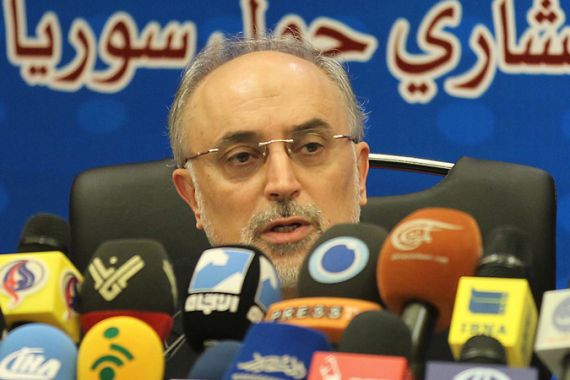Iran urges dialogue to end Syria war
Tehran appeals to Syria’s government and opposition to begin peace talks as it hosts conference on the conflict.

Iran has appealed to Syria’s government and the rebels fighting it to open peace talks as it hosted a hastily arranged international conference on the conflict in its key Arab ally.
Ali Akbar Salehi, the foreign minister, told diplomats from Russia, Pakistan, Afghanistan, Cuba, Venezuela and other nations that Tehran was prepared to also host such a dialogue, state television reported on Thursday.
Iran opposes “any foreign interference and military intervention in resolving the Syrian crisis” and supports UN efforts to end the bloodshed, Salehi said.
There was no indication Iran was modifying its strong support of Syrian President Bashar al-Assad, whose forces have been locked in an escalating war with rebels since an uprising against his rule started in March 2011.
The conference in Tehran came days after a senior aide to Iran’s supreme leader Ayatollah Ali Khamenei, Saeed Jalili, told Assad in Damascus that Tehran would not permit its alliance with his regime to be broken.
“Iran will never allow the resistance axis – of which Syria is an essential pillar – to break,” said Jalili.
The conference brought together diplomatic representatives, mostly ambassadors, from 29 countries, including Iran. None from Western states or Turkey, which backs the Free Syrian Army, or Arab countries in the Gulf that Iran accuses of arming Syria’s rebels.
Syria’s government itself was not represented, nor was Syria’s opposition.
‘Finger-pointing’
The meeting took place in the diplomatic vacuum left by Kofi Annan’s August 2 announcement that he was resigning as the UN-Arab League envoy on the crisis because of lack of UN Security Council support.
The United States and Russia, in particular, differ on how to tackle the Syrian conflict and have stalled any UN action. Moscow and Beijing have vetoed three resolutions within the Council to sanction Assad’s regime.
A frustrated Annan said the “continuous finger-pointing and name-calling” in the Council undermined his mission.
Iran announced the conference on Monday and said it was inviting only governments with a “realistic position” on Syria, implying those that shared its stance, mirroring that of Russia.
A senior foreign ministry official had said the meeting would be at foreign ministers level, but only three foreign officials of that rank turned up. They came from Iraq, Pakistan and Zimbabwe. Ambassadors filled most of the table.
According to Salehi, those represented were: Afghanistan, Algeria, Armenia, Benin, Belarus, China, Cuba, Ecuador, Georgia, India, Indonesia, Iran, Iraq, Jordan, Kazakhstan, Kyrgyzstan, Maldives, Mauritania, Nicaragua, Oman, Pakistan, Russia, Sri Lanka, Sudan, Tajikistan, Tunisia, Turkmenistan, Venezuela and Zimbabwe.
Tehran was attempting to revive parts of Annan’s plan, notably: implementing a ceasefire, sending humanitarian aid and laying the groundwork for national dialogue, he said.
Iran has already sent humanitarian aid, the foreign minister said, to make up for international sanctions on Damascus that were “not in the interests of the Syrian people but have added to their suffering”.